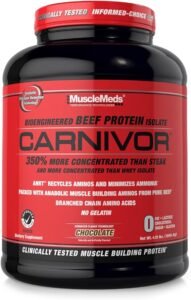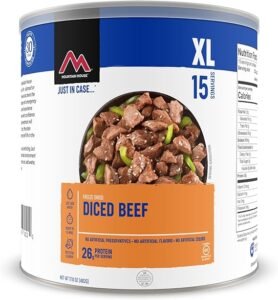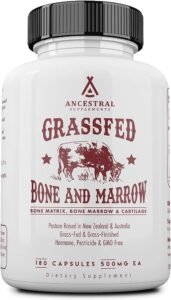Beef is the meat obtained from cattle, particularly from cows, steers, bulls, or heifers. It’s one of the most commonly consumed meats worldwide and is a significant source of protein in many diets. Beef comes in various cuts, each with its own texture, flavor, and culinary uses. It’s versatile and can be cooked in numerous ways, making it a staple in a wide range of cuisines across cultures.
Beef, a staple protein in many cultures around the world, has often found itself under scrutiny when it comes to health discussions. However, beyond the debates, beef packs a nutritional punch that often goes unnoticed. Here, we are exploring the health benefits of beef can shed light on its positive contributions to a balanced diet.
Omaha Steaks 28 oz. Fully Cooked Beef
Table of Contents
Some Characteristics of Beef
Color: Beef ranges in color from light pink to dark red, depending on the age of the animal and the cut of meat.
Flavor: Beef has a savory, umami flavor that is often described as “meaty” or “beefy.”
Texture: Beef can be tender or tough, depending on the cut of meat and how it is cooked.
Beef is a popular ingredient in many cuisines around the world. It is often used in steaks, roasts, stews, and ground beef dishes. Beef can also be cured and dried to make products like jerky and salami.
MuscleMeds, Carnivor Beef Protein Isolate Powder
Nutrients in Beef
Beef is a nutrient-rich food that can be part of a healthy diet. It is a good source of protein, iron, and zinc. Beef is also a good source of vitamins B6 and B12.
Protein
Protein is essential for building and repairing tissues, and it also helps to produce enzymes and hormones. Beef is an excellent source of high-quality protein, which means that it contains all of the essential amino acids that the body needs.
Among animal proteins, beef stands out as a “complete protein,” containing all essential amino acids required by the body. This completeness ensures that the body can readily utilize these amino acids for various bodily functions, aiding in muscle maintenance, hormone production, and enzymatic processes.
Iron
Iron is essential for carrying oxygen throughout the body. Beef is a good source of heme iron, which is more easily absorbed by the body than non-heme iron found in plant foods.
Zinc
Zinc is essential for wound healing, immune function, and growth. Beef is a good source of zinc. Zinc plays a pivotal role in bolstering the immune system. This essential mineral is involved in numerous enzymatic reactions and is vital for the development and function of immune cells. Including beef in one’s diet can help maintain optimal zinc levels and support a robust immune response.
Vitamins B6 and B12
Vitamin B6 is important for brain function and metabolism. Vitamin B12 is essential for red blood cell formation and nerve function. Beef is a good source of both vitamins B6 and B12.
Contrary to popular belief, beef is a notable source of various vitamins. It contains a spectrum of B vitamins, including B12, which plays a pivotal role in neurological health, DNA synthesis, and red blood cell formation. Additionally, beef provides B6, niacin, riboflavin, and others, contributing to metabolic functions and energy production within the body.
Other nutrients
Beef is also a good source of phosphorus, selenium, and niacin. Beef is a powerhouse of essential nutrients vital for the body’s optimal functioning. It’s a significant source of high-quality protein, delivering amino acids necessary for muscle growth, repair, and overall cellular function. Furthermore, beef is packed with iron, a crucial mineral involved in transporting oxygen throughout the body. This becomes especially relevant for individuals at risk of iron deficiency or anemia.
Mountain House Diced Beef
Health Benefits of Beef
Beef can be a part of a healthy diet when consumed in moderation. It is a good source of protein, iron, and zinc, and it has been linked to a number of health benefits. When choosing and cooking beef, it is important to select lean cuts and cook it to an internal temperature of 160 degrees Fahrenheit.
In addition to being a good source of nutrients, beef has also been linked to a number of health benefits, including:
- Improved muscle growth and maintenance
- Reduced risk of anemia
- Improved cognitive function
- Stronger bones
- Reduced risk of heart disease
Durkee Beef Stew
Some Tips for Choosing and Cooking Beef
While the nutritional benefits of beef are noteworthy, it’s crucial to approach its consumption mindfully. Opting for lean cuts and moderation in portion sizes is essential. Excessive intake of red meat, including beef, has been associated with certain health risks, such as cardiovascular diseases and some types of cancers. Pairing beef with a variety of vegetables and whole grains can create a balanced meal, reaping the benefits of both plant-based and animal-based nutrients.
The quality of beef matters significantly when considering its health implications. Grass-fed beef, for instance, tends to have higher levels of omega-3 fatty acids and antioxidants like vitamin E compared to grain-fed beef. These differences can impact the nutritional profile and health benefits of the meat.
When choosing beef, it is important to select cuts that are lean and low in fat. Lean cuts of beef include sirloin, flank steak, and round roast.
Lean cuts of beef are lower in fat and calories than fatty cuts. Some good choices for lean beef include sirloin, flank steak, and round roast.
Cook beef to an internal temperature of 160 degrees Fahrenheit: This will help to kill harmful bacteria and ensure that the beef is safe to eat.
Avoid deep-frying and grilling beef at high temperatures, as these methods can produce harmful compounds. Instead, try baking, broiling, or roasting beef.
Ancestral Supplements Grass Fed Beef Bone and Marrow Supplement
Why Beef Is Consumed Worldwide?
Beef is consumed worldwide for several reasons, rooted in its nutritional value, taste, cultural significance, and availability.
Nutritional Value: Beef is a rich source of high-quality protein, essential amino acids, vitamins (like B12 and B6), minerals (such as iron and zinc), and other nutrients. Its nutritional density makes it an attractive choice for meeting dietary needs, especially in areas where protein intake is a concern.
Taste and Versatility: The flavor and texture of beef make it a versatile ingredient in various cuisines. It can be grilled, roasted, stewed, or used in countless recipes, offering a wide range of culinary possibilities. Its taste appeals to diverse palates, contributing to its popularity worldwide.
Cultural Significance: In many cultures, beef holds significant culinary and cultural importance. It’s featured prominently in traditional dishes and celebratory meals, symbolizing hospitality, prosperity, and special occasions. For instance, in some cultures, beef is central to festivals, weddings, or religious ceremonies.
Availability and Livestock Rearing: Cattle farming is prevalent in numerous regions globally, contributing to the widespread availability of beef. This accessibility makes it a readily accessible protein source in many diets.
Economic Factors: Beef production and trade play a crucial role in the economy of several countries. Exporting and importing beef contribute significantly to the global food market, meeting the demand for meat in various regions.
The combination of its nutritional content, taste, cultural significance, and availability has propelled beef consumption on a global scale, making it a staple food in many diets worldwide.
Mountain House Cooked Ground Beef
Conclusion:
Beef, when consumed in moderation and as part of a balanced diet, can offer an array of health benefits. Its rich nutrient profile, including essential proteins, vitamins, and minerals, contributes to overall well-being and vitality. However, it’s essential to be mindful of portion sizes, opt for lean cuts, and balance its consumption with other food groups for a holistic approach to nutrition. Embracing the positives while being conscious of potential risks allows individuals to enjoy the health benefits beef has to offer.
Also Read: Omega-3 Fatty Acids Health Benefits and Precautions
Image credit: Amazon.com, Yandex.com










